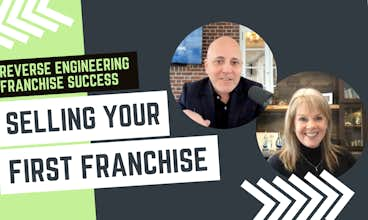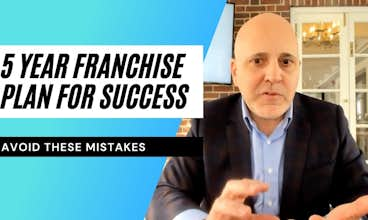Dirty Dough founder Bennett Maxwell shares insights for scaling fast and staying sane in a competitive industry.
KEY TAKEAWAYS:
- While organic growth is best for new franchisors, fast growth can sometimes offer advantages for brands in hot markets.
- Having a franchise sales process is important for scaling a brand – including knowing your numbers and differentiating your offering from competitors.
- Adopting the right mindset is critical for building and scaling a franchise system successfully.
When Bennett Maxwell bought his friend’s Tempe, Arizona-based cookie company amid the chaos of the pandemic in late 2020, he wasn’t sure what to expect – or what came next.
“I didn’t know what an FDD was, or a franchisee or franchisor, but I’m like, ‘I’m gonna buy this (business) and I’m gonna franchise it,’” Maxwell recalls.
And that’s exactly what he did. In less than a year, Maxwell developed the small cookie shop with a catchy name – Dirty Dough – into a franchisable retail concept with systems and processes that were ready to duplicate in other locations around the country, including recipes for the brand’s signature multi-layered cookies. Leaning into his sales background as the former owner of a residential solar brokerage firm, Maxwell spent the next two years growing the business to 100 units and later adding hundreds more to its pipeline nationwide, even as he overcame the challenges of high-profile lawsuits, market saturation and fierce competition that sometimes left him feeling overwhelmed.
But while Dirty Dough’s fast growth was impressive, it was also unusual in an industry that often favors slow, organic expansion. Still, Maxwell’s fast-tracked journey from a new small business owner to a thriving franchisor can offer valuable lessons for entrepreneurs looking to grow their brands under demanding circumstances – including strategies for scaling a franchise in a hot market, surviving litigation from competitors and managing stress while growing a business.
Transforming obstacles into opportunities
For Maxwell, the challenges of franchising started early despite his efforts to lay a strong foundation for Dirty Dough by perfecting its business model, selecting a strong team and even bringing on Jill Summerhayes, the founder of Maui Wowi Hawaiian Coffees and Smoothies, as the brand’s CEO.
“We had a good model, had a good CEO, really good advisors as well. We just needed eyes,” Maxwell says.
In June 2022, the fledgling brand got the public attention it was looking for when a major competitor in the gourmet cookie space filed a lawsuit against it – a dispute that impacted the brand’s Item 3 disclosures but ultimately backfired after the small-but-mightly cookie franchise launched a humorous advertising campaign in response to the litigation, poking fun at the situation while positioning itself as a David facing off against a litigious Goliath.
The clever ads earned Dirty Dough national visibility and recognition from corporate TV programs and major news outlets including Good Morning America and CNBC. While the lawsuit ended in a settlement the following year, the publicity the brand garnered throughout the litigation process catapulted it into the national spotlight – and maybe even played a role in its expansion.
“They sued us when we had one store, and then they made us into their biggest competitor,” Maxwell says.
Developing a recipe for growth
As Dirty Dough continued to leverage growth opportunities in a trendy market that was quickly becoming saturated with new competitors, Maxwell scaled the business from 100 units in its first two years to nearly 450 in the years that followed. While the unusually fast growth came with its own set of challenges, he credits the fast-paced sales for the brand’s existence today.
“I do think we’re still here because of the fast growth,” Maxwell says.
For Dirty Dough, some of the advantages of fast brand growth included the following:
- Economies of scale. The brand was able to spread the costs of warehousing and equipment across hundreds of locations, rather than just a few.
- Vertical integration. Cookie manufacturing was eventually centralized, offering more control over production and distribution.
- Brand awareness. Quick expansion helped the brand build an audience and attract attention – and customers – across the country.
Despite the benefits, though, hypergrowth also came with challenges. Some disadvantages of the brand’s fast growth included the following:
Wasted resources. Fast-paced growth made it difficult to recognize the right time to outsource services and logistics, resulting in temporarily decreased efficiency.
A lot, too fast. The brand closed several corporate locations to focus on helping franchisees open their businesses.
Economic challenges. A downturn may have had less impact if the brand had grown more slowly.
While Maxwell says slower growth is preferable, he notes there are benefits and risks no matter how it’s approached. When it comes to Dirty Dough’s strategy of growing fast in a market rife with competition, he seems comfortable with the outcome.
“There’s definitely pros and cons to both (slow and fast growth). If I did it again, I’m incapable of growing slower – you know, maybe 100 franchises, not 400, to start out with,” Maxwell says.
Developing a better growth strategy
Despite the brand’s success, Dirty Dough’s transition from a small business in Arizona to a growing national franchise system wasn’t always easy – especially after the economy, and the gourmet cookie market, began to falter in 2022.
“We were growing it with the hype, but we also got hit with a pretty big downturn, not just on cookies but inflation with food. So that was really rough. If we were (growing) a lot slower, we wouldn’t have been affected as much,” Maxwell says.
To mitigate those challenges, Maxwell focused on developing a franchise sales process that leaned into honesty while addressing the pros and cons of the franchise offering. For new and emerging franchisors looking for ways to improve their sales strategy, Maxwell says the following strategies can be helpful:
- Stay flexible. Be open to change and continuous improvement over time.
- Identify pros and cons. Identify the top three reasons someone would want to invest in your offering – and the top three reasons why they wouldn’t. Adjust accordingly.
- Differentiate. Identify candidate objections, get familiar with competitors’ numbers and look for differentiators that set your brand apart.
- Be selective. Look for prospective franchisees that are a good fit, and don’t be afraid to point them elsewhere if necessary.
For prospective franchisees who are considering buying a franchise, Maxwell stresses the importance of reviewing the offering’s Franchise Disclosure Document and Item 19, looking for a three-year payback and getting validation before signing.
“You really need to get other people to validate (the offering). Not the salesperson, not the owner – the franchisees that have been in it for a while,” Maxwell says.
Moving forward and taking a deep breath
In 2024, Maxwell’s years of hard work and strategic planning finally paid off when Dirty Dough was acquired by Craveworthy Brands, an investment firm that maintains a portfolio of food and restaurant brands across the country.
The exit allowed Maxwell to continue building his personal brand – something he credits at least part of Dirty Dough’s growth to – while helping other franchisors develop, grow and scale their businesses through digital media and video education.
For Maxwell, personal growth has also been a theme in the last few years, including losing weight and finding ways to manage the stress that came along with growing a franchise system from the ground up. He says he’s learned to let go of the need for control and the fear of failure and disappointing others, instead adopting a mindset that’s detached from outcomes – something that has allowed him to look toward the future with less anxiety as a young entrepreneur.
“Now I only have one problem to solve – and that’s my brain and my thought patterns, rather than having to fix every issue in my business,” Maxwell says.
Learn about franchise opportunities with Dirty Dough at https://dirtydoughcookies.com/franchising.
Note: The franchisor featured in this article is not a client of The Internicola Law Firm





